Some of my clients have reported gaining weight after doing intermittent fasting. So if you’re wondering why am I gaining weight on OMAD, this article will hit home with you.
In general, people are usually gaining weight on OMAD because they overeat. There are several reasons why people eat more. This may be poor hunger tolerance or an accumulation of stressful and unexpected events.
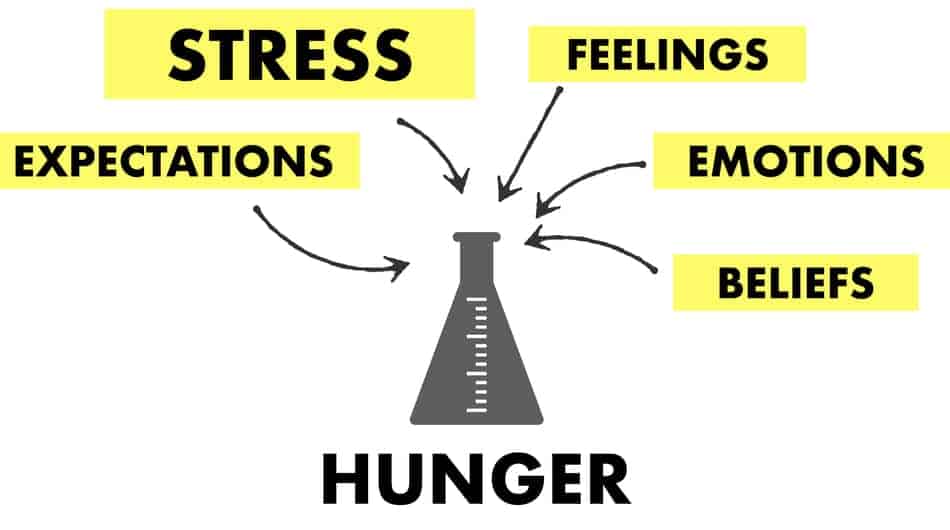
In other words, things happen. And there are multiple reasons why people lose control. Plus, all it takes is one binge day a week to trigger weight gain. So the real question should be why am I overeating?
Gaining Weight On OMAD
It is possible to gain weight on OMAD because of high expectations, stress, psychological hunger, and the habit of regulating emotions by using food. Those are all possible reasons why people gain weight on OMAD.
People who have too much going on on their plate will look for ways to reduce stress. And if someone has a weight problem, it is very likely they’ve been using food as a emotional blanket.
So food is not the problem. The problem is the problem.
That’s why being on OMAD and gaining weight is the first sign that there may be some other problem in the background. And we are using food to “escape” from that problem (source).
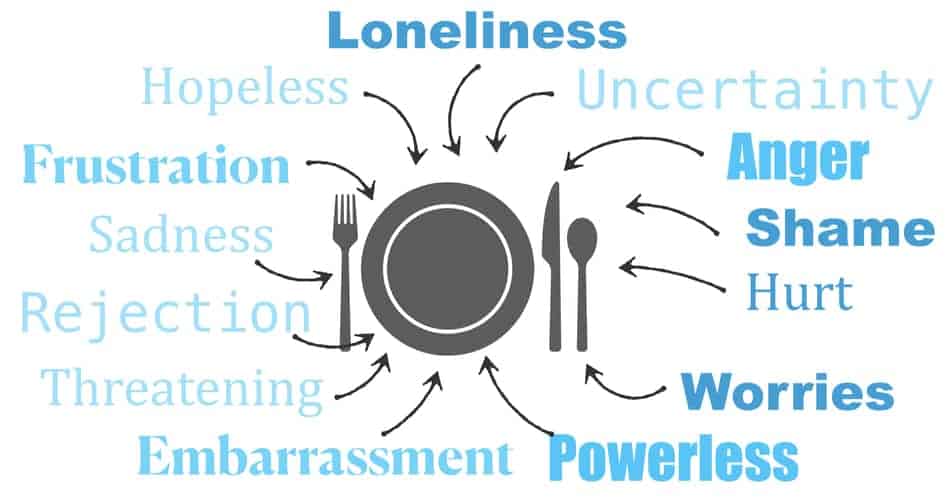
When we have too high expectations, fear of judgment, or fear of feeling uncomfortable in general, this leads to more anxiety and stress (source).
For instance, people who afraid of being uncomfortable will do whatever it takes to feel normal. That’s why people don’t like exercise, read books, spend less money than they earn, or diet for a long time.
But being uncomfortable is very subjective. So for someone being hungry may be no big deal, where for others it will feel like the end of the world.
Why I’m Losing Control On OMAD?
People are losing control on OMAD because they feel uncomfortable. Caloric restrictions add extra pressure to their life, and they are not able to cope with that pressure. When you reduce the stress, you will be able to have more control.
Also, if you’re finding yourself that you’re using food as entertainment, you may have a hard time differentiating between psychological hunger and real “physical” hunger (source).
That’s what I used to do. All-day long I was snacking here and there. I snack when I was angry. I snack when I was excited. I snack on every emotional whiff.
So once I started doing intermittent fasting, feeling real hunger was a shock. It was like a cold shower. And now I couldn’t use food anymore to mask my emotions. So it felt like I was exposed to cope with novel situations.
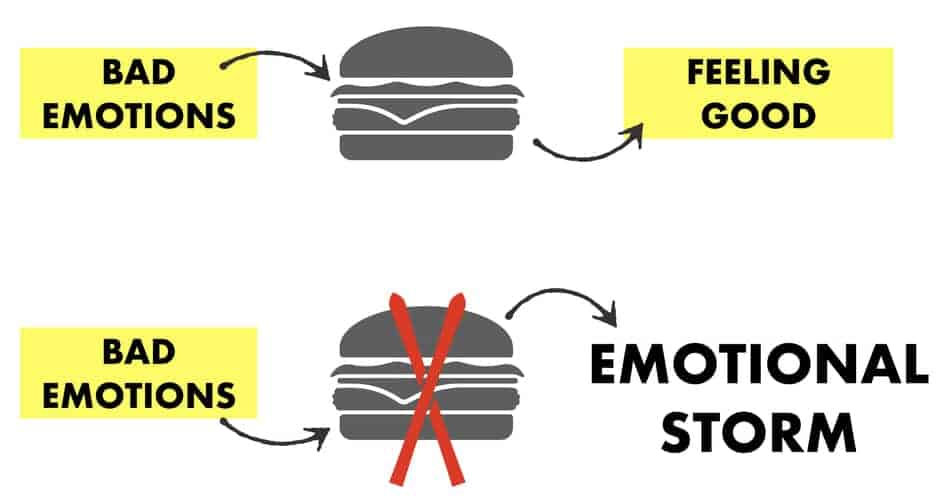
Not being able to tell the difference between psychological hunger and physical hunger is a clear sign of using food as a vehicle to regulate emotions. Because how can you know how does physical hunger feels if you’re constantly using food to feel better (aka eating)?
Apart from that, there is a number of other factors that can contribute to feeling hungry and gaining weight on OMAD.
What Makes Your Body Feel Hungry?
The body can feel hungry because of things that we eat on the last meal, hormonal levels, biological rhythm, psychological triggers, and individual aspects. The more you will reduce triggers from your environment that cause you to eat, the better your results.
So it’s not just the emotions that play a role here. It’s the whole gamma of triggers that actively influence our decisions. And the more precisely you will be able to identify those triggers (aka your blind spots), the more likely you will stay in control (source).
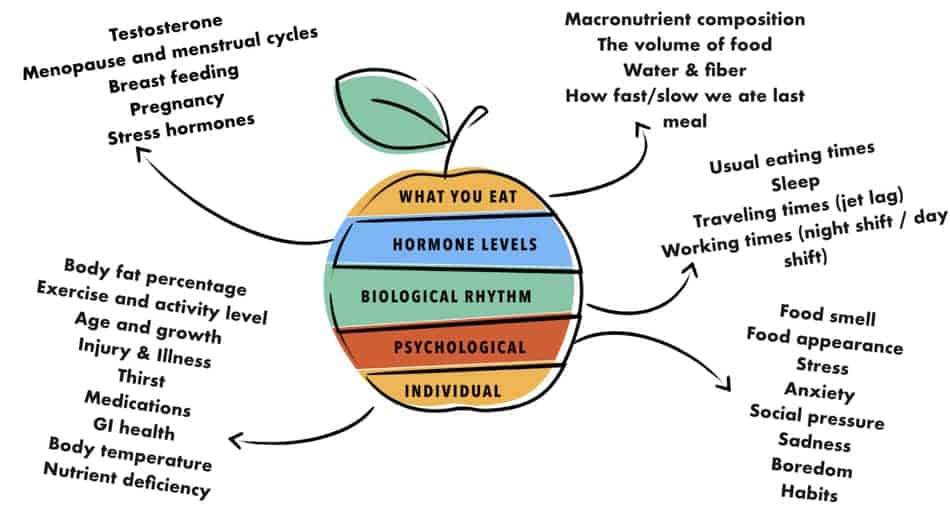
Intermittent fasting is not for everyone. Many organisms can manage (even thrive) while being in a caloric deficit. But for humans that require some skills.
Depending on what type of person are you, how you respond to a lack of food, what else is going on in your life, and what are your believes around not eating; are just a few of the factors that will dictate how successful you will be on OMAD.
Factor #1: Bio-Psycho-Social Model
This is what I see a lot. People want to lose weight and they follow the steps of their friends, trainers, or even some X guru that recommends them fasting and swear by the results.
After doing some individual research they know what to do. Once they start, after a week or two it turns out that this fasting is actually making them feel weird.
They may feel stressed out, anxious, lethargic, and unable to focus. But the situation isn’t terrible, so they continue. Until one day something happens. It’s like building a house of cards. You spend time and effort to place cards on top of each other, and then one mistake and BOOM!
Cards everywhere.
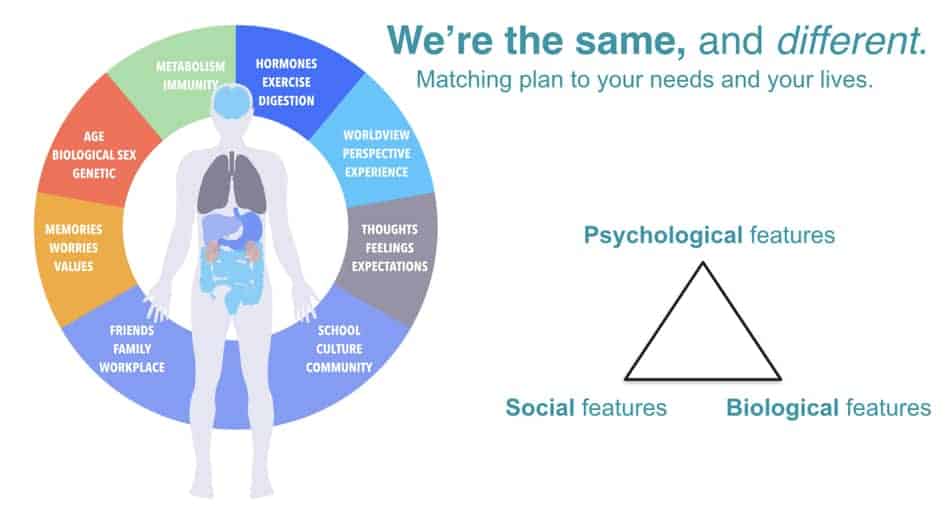
As you can see on the graph, we are all the same, but we are also different. We may all have the same physiological abilities, but several factors distinguish one person from another. Here are some of the most common aspects that will influence your results (source).
Factor #2: Levels Of Stress
Bad stress makes our world smaller. It prevents us from thinking clearly, be proactive, and making smart decisions. It’s like a pebble in your shoe.
You just want it out of your life. On the other hand, we need some level of stress that is pushing us forward. This can be a deadline at work, a physical workout, or a cold shower.
It simulates us temporarily to act and to be productive. That is good stress. And having the right amount of “good stress’ can actually be healthy. Intermittent fasting is a perfect example.
It can be healthy if it’s done within your unique boundaries. But if you already have too much on your plate, it can bite you in the ass.
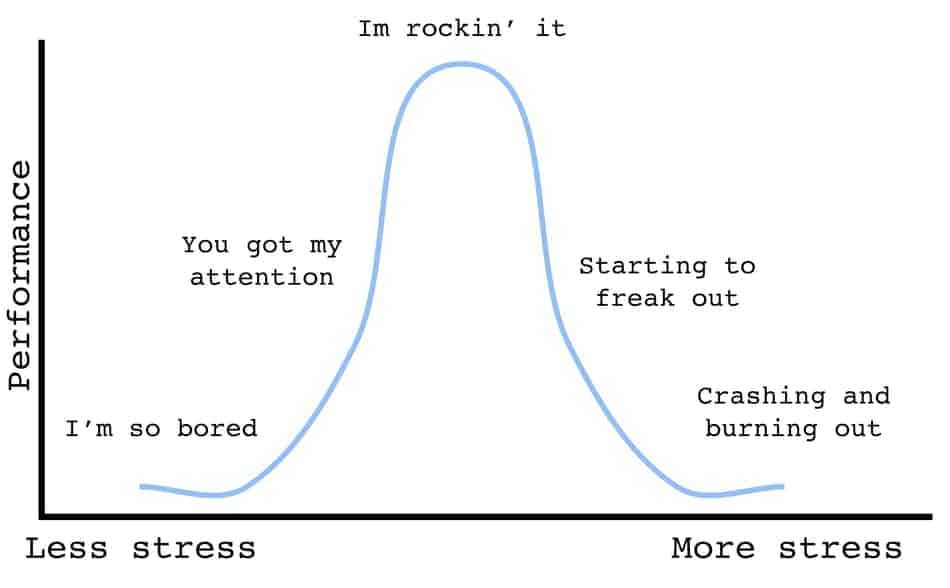
In other words, people crack under pressure and lose control with too much stress. And if the typical way to reduce stress is eating, then viola! We are gaining weight.
Factor #3: Good Stress vs Bad Stress
The difference between good stress and bad stress is your individual ability to recover from it. If your life is less stressful in general, you can handle any additional pressure.
But if you have already too much already going on, it can bring havoc to your life. There is a fine line between too much and too little.
This fine line is called allostatic load. Allostatic load is the accumulation of stressors that are going on in your life.
This includes physiological stressors (physical activity, high-demand job, long working hours, lack of sleep, etc.) and psychological stressors (depression, anxiety, emotional tangle, negative self-talk, self-criticism, etc.).
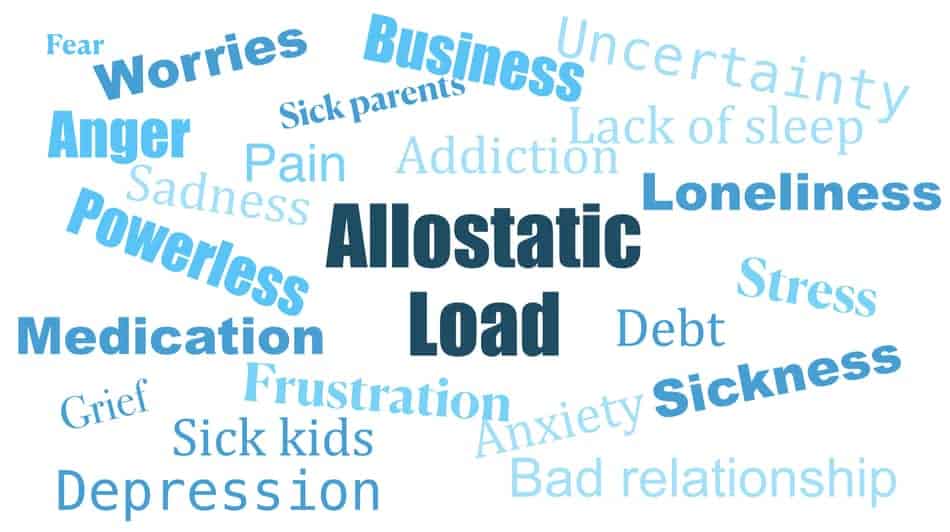
That’s why you can have two different people doing the same OMAD approach, where one is thriving and another one is miserable. One is in control, the other one is losing control. One is energized, another one is exhausted (source).
One is gaining weight on OMAD and one is losing weight. One is gonna break down and binge, the other one is just fine.
Factor #4: Your Environment
There is a saying around coaches that the easiest way to change the habit is by changing the environment (source).
And your environment can either support or destroy your results. What do I mean about the environment? Everything that is around you.
Please remember that those are just the examples, not the absolute predictors of failure or success.
Your work environment and people that you work with. There is a saying that you become the reflection of 5 people that you surround yourself with. And what if all 5 of those people doesn’t care about health and fitness?
Your home environment. If your house is full of tempting foods that drain your willpower, then it can be difficult to maintain the results. If there is food in your house or your possession, either you or someone that you care for sooner or later will eat it.
If the food is constantly in your eye sight then it will be difficult to restrain from not eating.
Your community and beliefs around food and not eating. If you’re part of the community where there is an abundance of food, and some people may have different beliefs about your new OMAD story, it may trigger your appetite and cravings that will plant the seed in your mind. You may not eat something right away, but in a day or two you can break down.
Your social environment. If you enjoy meeting with friends and there is always food around, you may start to have some social friction that will lead to difficult decisions. It’s not easy to say no to food or alcohol when everyone is having a good time.
Factor #5: Gender Difference
There are some biological differences in how men and women respond to the caloric deficit and intermittent fasting. Women’s bodies seem to be more “protective” against energy deficit.
“During fasting, women have lower plasma glucose levels than men despite higher plasma FFA, suggesting protection from FFA-induced insulin resistance.”
National Library Of Medicine
In general, women have more fat than man. And it’s harder for the average women to lose fat than the average man. I’ve noticed that myself after working with couples.
The husband could easily drop 25-pounds just by cutting down on alcohol and soda, where the wife was struggling to lose 5-pounds while changing her diet and workout daily.
Women have higher levels of appetite hormones (ghrelin) than man, therefore they will feel more hungry during the fasting period.
Hunger levels are related to the hormone called ghrelin.
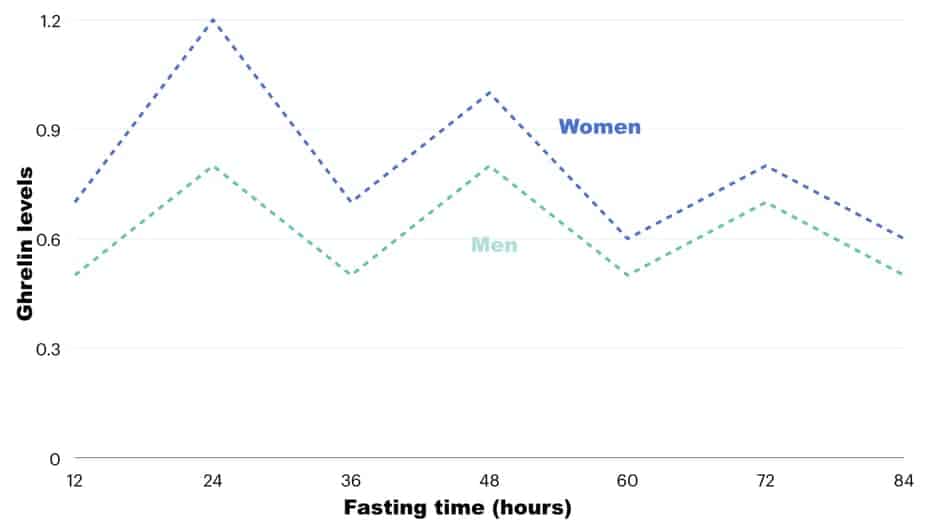
For instance, for an average man, being without food for 20-24 hours may feel like 7/10, and for an average woman, this may feel like 9/10. This means women will experience more hunger, cravings, mood swings, and urges to eat while fasting.
This also means that fasting will trigger more stress in women and to man. Yes, biology is complex
What Can You Do
Getting results is one thing, but maintaining results is a completely different game. Germans have a world for it.
Sitzfleisch. It literally means staying in power.
Self-awareness is the tool that will help you stay in power.It is your new secret weapon for staying in control.
The good news is that once you know exactly what can interfere with your results, and potential binge eating episodes, you can use that to your advantage.
Self-awareness is about becoming more aware of your thoughts, feeling, and emotions. It’s about knowing yourself, better. Once you know how your body respond to certain situations, you can use that for your benefits.
Let me give you an example of self-awareness.
City traffic planners discovered that by just adding the countdown timer to the pedestrian crossing, people stopped running across the street at the last minute. Just by letting people know how much time they have left, it was enough to change their behaviors.
Nobody told them to stop running. They did it by themselves. Because they were more aware.
Another example.
Have you ever had an episode of a night out using a credit card? And only after you saw the bill, you had this “Aha” moment?
Those examples are how powerful self-awareness is. It’s like making invisible, visible. It’s like when you ring the bell, you cannot un-ring it anymore. It’s done.
Once you are aware of something, you cannot be unaware.
How to use that into your OMAD practice? Simple.
Use a food journal. Food journal brings “invisible” into your conscious awareness. It’s like a bill for your credit card. And it can be done in many ways. You can write down things that you eat. And you can write down your thoughts, feelings, and emotions.
Here is the example.
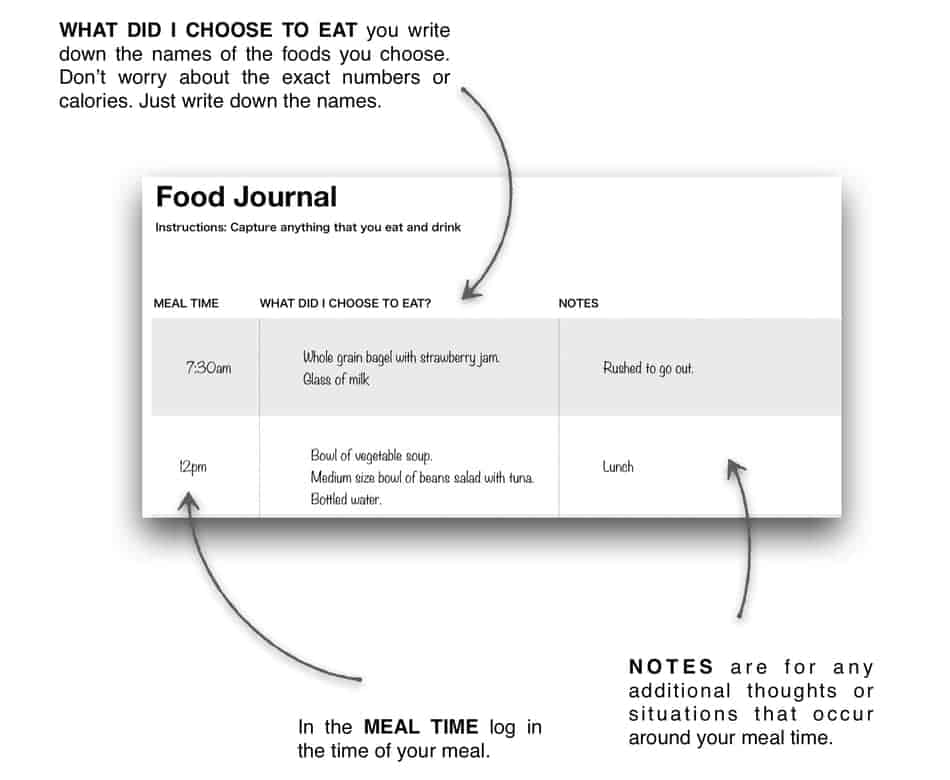
This simple method will help you to discover things that may have been out of your sight.
For example you may notice that:
- You feel more hungry after Tuesday meetings versus Friday meetings.
- You feel less stressed when you do shopping at 10 am versus 4 pm.
- You feel more energized after a 20-minute walk versus 20-minute HIIT training.
- You always over-eat when you’re in place A versus place B.
This is important data, and it can be used to craft your individual action plan. Because once you know your “blind spots” you can go around them.
Take Away
A lot of things are wrestling for our attention. And if you’re distracted, it is very easy to fall off the wagon. Those tips gonna help your not only to start getting results but also to always have something that works whenever you fall off the wagon again.
Go Further with OMAD
This article is part of the Doing OMAD But Not Losing Weight
In the following pages, I show you all the related aspects necessary to troubleshoot all the reasons why OMAD may not work and what you can do about it.
Next: Click here to learn more about can you overeat on omad
